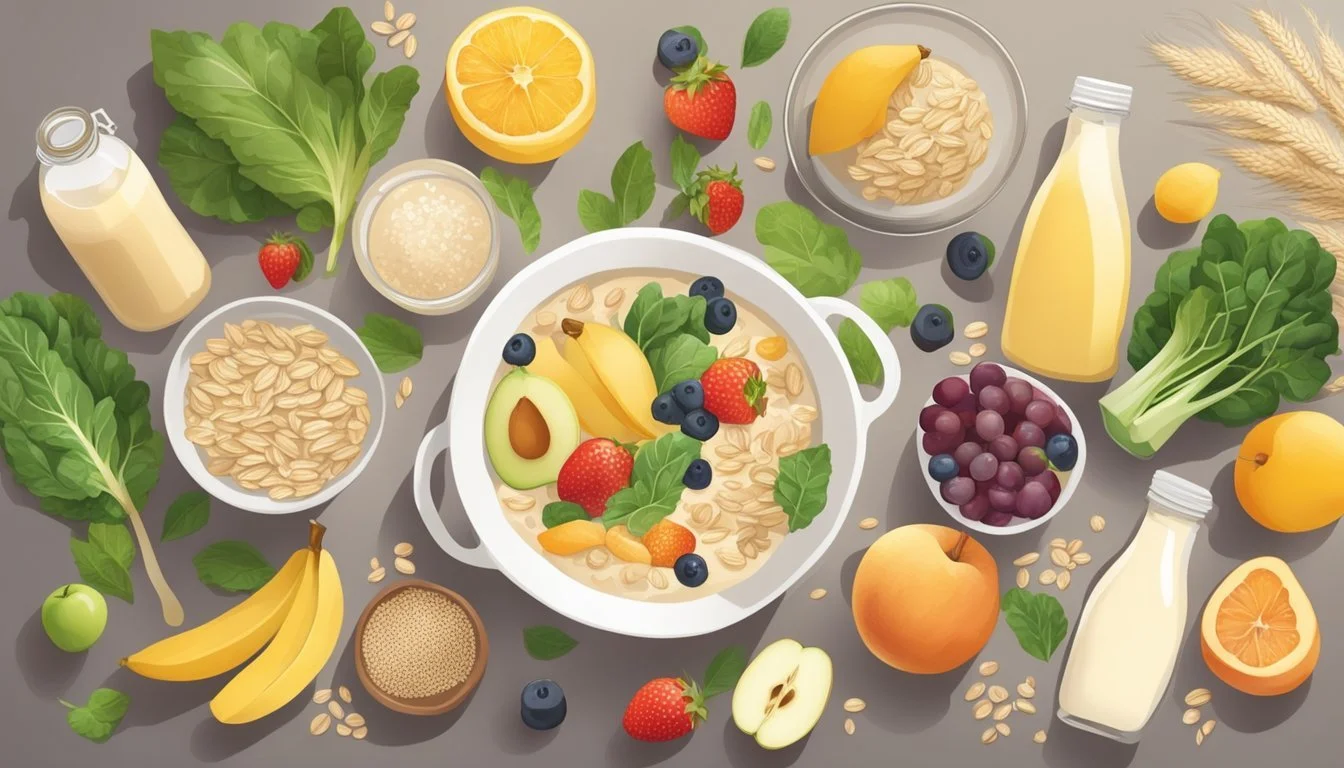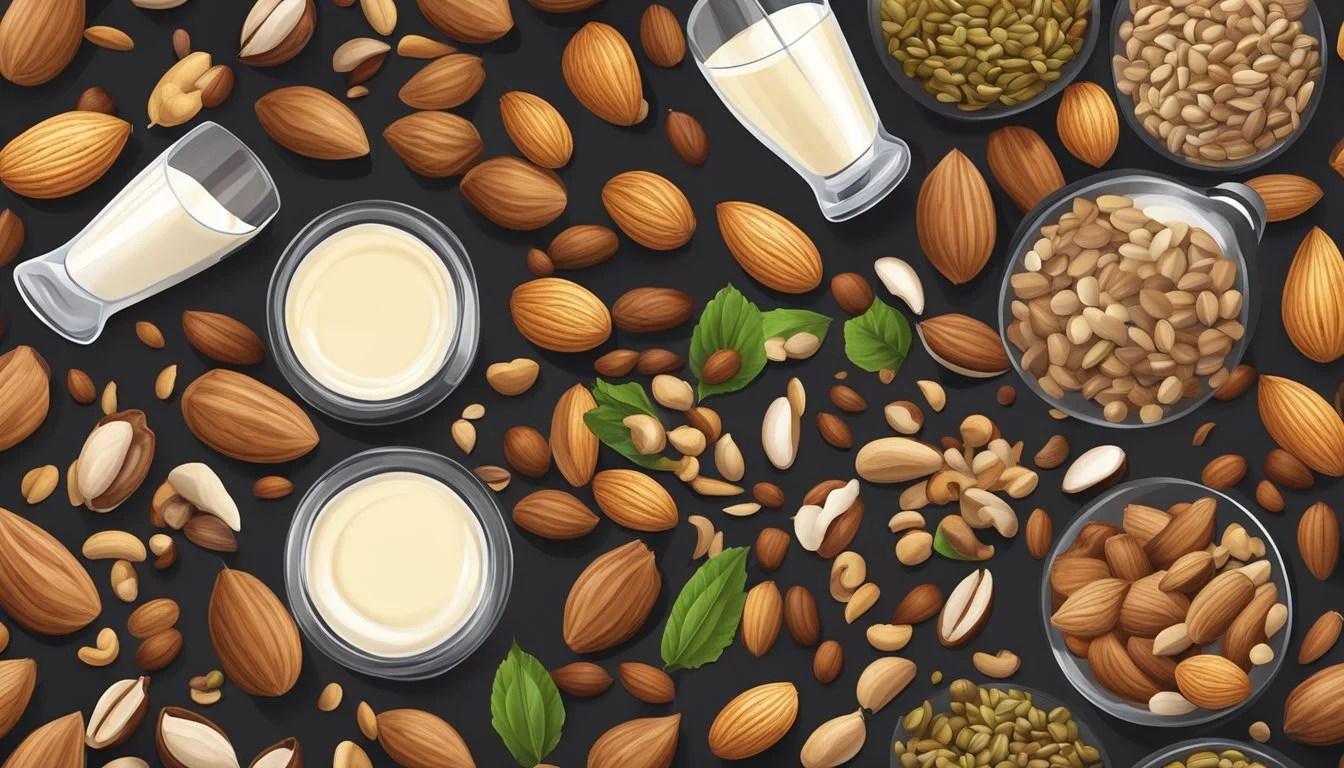Nutrient-Rich Foods That May Boost Breast Milk Production
Breastfeeding is a vital aspect of nurturing a newborn, providing them with essential nutrients and aiding in their overall development. Many new mothers seek methods to naturally enhance their milk supply to meet the dietary needs of their babies.
Certain foods are believed to support lactation by influencing hormonal balance and overall health. Incorporating these dietary choices can be a practical and beneficial approach for mothers looking to boost their breast milk production. Understanding the role of nutrition in lactation can empower mothers to make informed decisions for their well-being and their baby's growth.
1) Oatmeal
Oatmeal is a widely recognized food that can help increase breast milk supply. It contains saponins, which may support hormone levels related to milk production.
Many breastfeeding mothers notice a boost in their milk supply after adding oatmeal to their daily diet. Typically, a bowl of slow-cooked old-fashioned oatmeal is recommended over instant oatmeal.
Oatmeal can be consumed in various forms, such as porridge, oatmeal cookies, or even oat milk. Adding a daily serving of oatmeal could potentially enhance milk production within hours.
For those in need of quick preparation, instant oatmeal can still provide benefits, though not as nutrient-rich as its less-processed counterpart. Cooking from whole oats ensures greater retention of nutritional value.
Incorporating oatmeal into breakfast foods or snacks can make it a convenient addition for busy mothers. Simple recipes like oatmeal tea, made with boiling water over oats, can also be effective.
Eating between 1/2 to 1 cup of oatmeal daily often provides noticeable results. Many mothers find this dietary addition both easy and beneficial for maintaining and increasing breast milk supply.
2) Fenugreek Seeds
Fenugreek seeds, derived from the fenugreek plant (Trigonella foenum-graecum), have long been used as a natural remedy to boost breast milk production. These small, golden seeds are rich in phytoestrogens, which are believed to stimulate milk flow in nursing mothers.
Many mothers report noticing an increase in milk supply within 24 to 72 hours of consuming fenugreek. However, results can vary, and some might see changes only after two weeks. Fenugreek can be consumed in various forms, including capsules, teas, and as an ingredient in foods.
To make fenugreek tea, rinse a teaspoon of seeds per cup of water and boil in a pot. The seeds can also be ground into a powder and added to meals. Although widely used, scientific studies on fenugreek's effectiveness have shown mixed results.
While some research suggests benefits, others indicate minimal impact. Its use for centuries in traditional medicine underscores its popularity despite the lack of consistent scientific backing. Breastfeeding mothers should consult healthcare providers before starting any new supplement, including fenugreek, to ensure it is appropriate for their specific situation.
3) Spinach
Spinach is a nutrient-dense leafy green often recommended for breastfeeding mothers. It is rich in iron, calcium, and folic acid, all of which are crucial for replenishing and maintaining the mother’s health postpartum.
Iron helps combat postpartum anemia, a common issue that can impact milk supply. Calcium supports both mother and baby’s bone health during breastfeeding.
Spinach also contains plant-based compounds that may support lactation. Including spinach in the diet can be as simple as adding it to smoothies, soups, or salads.
Spinach offers additional benefits such as vitamins A and C, which are important for immune function and skin health. These benefits ensure that both the mother and baby receive essential nutrients during breastfeeding.
4) Brewer's Yeast
Brewer's yeast is commonly regarded as a galactagogue, a substance that may help increase breast milk supply. It's a rich source of B vitamins, important for overall health and energy levels. These nutrients are vital for lactating parents, contributing to the production of breast milk.
Aside from B vitamins, brewer's yeast contains protein, iron, selenium, and chromium. These minerals play crucial roles in supporting the body's functions. For instance, protein is essential for cellular repair and growth, while iron is key for oxygen transport in the blood, which may aid lactation.
Brewer's yeast also contains phytoestrogens. These plant-based compounds can mimic estrogen in the body, potentially benefiting breast tissue health. By doing so, they may support the overall lactation process.
Despite its traditional use and nutritional benefits, scientific evidence on brewer's yeast's effectiveness in boosting milk supply remains inconclusive. Some studies highlight its potential, but more research is needed to firmly establish its efficacy.
Lactating parents considering brewer's yeast should do so in moderation and consult healthcare providers. It can be added to foods like bread or cookies, providing a nutritious addition to the diet while possibly aiding milk production.
Incorporating brewer's yeast into a balanced diet could offer beneficial nutrients crucial for both the parent's and the baby's health. It represents one of several tools that may support breastfeeding efforts.
5) Flaxseeds
Flaxseeds are known to be beneficial for lactating mothers. They are rich in essential fatty acids, particularly omega-3, which support overall health.
These seeds also contain phytoestrogens, plant compounds that may help balance hormones involved in milk production. Including flaxseeds in a diet can potentially enhance breast milk supply.
Flaxseeds can be added to a variety of foods. They can be sprinkled on yogurt, mixed into smoothies, or incorporated into baked goods.
It’s important to consume flaxseeds in moderation and to consult with a healthcare provider, especially if there are any underlying health conditions.
6) Garlic
Garlic is a widely used herb known for its health benefits and culinary uses. It is also believed to be a galactagogue, a substance that promotes milk production in nursing mothers. This belief has been supported by its long history of use as an herbal remedy to boost breast milk supply.
When breastfeeding mothers consume garlic, some studies have shown that their infants tend to stay at the breast longer, possibly due to the flavor of the milk. Garlic's strong odor is transferred to breast milk, which some infants seem to enjoy.
In addition to its potential benefits for milk supply, garlic is nutritious. It provides essential vitamins and minerals, including vitamin C, vitamin B6, manganese, and selenium. These nutrients contribute to the overall health of breastfeeding mothers.
While some mothers report success with garlic, scientific evidence on its effectiveness as a galactagogue is mixed. Despite this, many continue to use garlic in their diet to support lactation. Supto further research, it is advisable for nursing mothers to consult with healthcare providers before making any significant dietary changes.
7) Brown Rice
Brown rice is a nutritious option for those looking to increase their breast milk supply. It is a whole grain that retains its bran and germ, which are rich in essential nutrients.
Brown rice offers complex carbohydrates and fiber. These components help maintain steady energy levels for breastfeeding mothers.
It is also a source of B vitamins, which support cellular energy production and overall health. Adding brown rice to meals can provide a consistent nutrient boost.
Brown rice can be easily incorporated into various dishes such as stir-fries, soups, or salads. Its versatility makes it a convenient choice for busy parents.
8) Nuts and Seeds
Nuts and seeds are excellent sources of nutrition for breastfeeding mothers. They provide essential protein, healthy fats, vitamins, and minerals that support overall health and milk production.
Almonds are particularly popular among breastfeeding moms. They are a good non-dairy source of calcium and also contain vitamin E, which is beneficial for skin health.
Sesame seeds are another valuable addition. They can be eaten alone, mixed into recipes, or used as a topping for salads. They are rich in calcium, iron, and magnesium, all of which are important for lactation.
Chia seeds and flax seeds offer a variety of nutrients, including omega-3 fatty acids. These nutrients can enhance the quality of breast milk and support both the mother’s and baby’s brain development.
Cashews and macadamia nuts provide healthy monounsaturated fats and antioxidants. These can boost the immune system and provide energy for the mother.
Incorporating a variety of nuts and seeds into the diet can be an easy and effective way to help maintain and potentially increase breast milk supply. Pricing and availability of these foods may vary, but they are generally accessible and versatile.
9) Carrots
Carrots are beneficial for increasing breast milk supply. Rich in beta carotene, they support lactation as this nutrient is important for milk production.
Carrots also provide a good source of Vitamin A. This vitamin is essential not only for the quality of the milk but also for the overall health of both mother and baby.
Including carrots in the diet can also boost blood circulation. Improved blood flow may indirectly help in maintaining a healthy milk supply.
Eating carrots can be easy and versatile. They can be consumed raw, cooked, or added to soups and stews, making them a convenient choice for nursing mothers.
10) Barley
Barley is a grain that has been recognized for its potential to increase breast milk supply. Containing complex carbohydrates and fiber, it provides essential nutrients that support lactation.
Rich in beta-glucan, a polysaccharide that may enhance the hormone prolactin, barley might boost milk production. Including barley in the diet can therefore be beneficial for breastfeeding mothers.
Barley can be consumed in various forms such as soups, stews, or as a side dish. Its versatility in cooking makes it easy to incorporate into everyday meals, providing both nutritional and lactogenic benefits.
In addition to its milk-boosting properties, barley is also packed with vitamins and minerals. It contains iron, magnesium, and B-vitamins, which are important for overall health and energy levels.
Understanding Breast Milk Production
Breast milk production is a complex process regulated by hormones and influenced by various factors. Key components include the role of specific hormones and lifestyle influences on milk supply.
Role of Hormones in Milk Production
Hormones play a pivotal role in the regulation of breast milk production. Prolactin and oxytocin are the primary hormones involved.
Prolactin is responsible for stimulating the alveoli, the milk-producing cells in the breast, to produce milk. High levels of prolactin are essential during the early stages of lactation and help maintain milk production throughout breastfeeding.
Oxytocin triggers the milk ejection reflex, also known as the "let-down" reflex. When the baby sucks at the breast, oxytocin is released, causing the milk to flow from the alveoli into the milk ducts and out of the nipple.
Other hormones such as estrogen and progesterone also support breast tissue development and function during lactation.
Factors Affecting Milk Supply
Multiple factors can impact breast milk supply, both positively and negatively.
Frequency of Nursing: Regular breastfeeding or pumping sessions stimulate the breast, promoting continuous milk production.
Hydration and Nutrition: Adequate fluid intake and a balanced diet rich in vitamins and minerals support milk production. Foods like oats, fenugreek, and brewer's yeast are known for their lactogenic properties.
Stress Levels: High stress can negatively impact milk supply. Practices like skin-to-skin contact with the baby help reduce stress and encourage milk production.
Health Conditions: Certain medical conditions such as thyroid imbalances or hormonal disorders can interfere with milk supply. It’s crucial for nursing mothers to monitor their health and consult healthcare providers if needed.
Maintaining an optimal balance of these factors is essential to ensure a steady and healthy milk supply.
Nutritional Requirements for Lactating Mothers
Lactating mothers have unique nutritional needs, requiring an adequate intake of calories, essential nutrients, and fluids to support both their health and the baby's growth and development.
Essential Nutrients
Lactating mothers need increased calories to support milk production. They need about 340 to 400 extra kilocalories per day, making their daily intake roughly between 2,000 to 2,800 kcal. Protein is crucial, aiding tissue repair and milk synthesis. Foods like lean meat, beans, and dairy can help. Calcium supports bone health, and sources like milk, yogurt, and cheese are recommended.
Vitamin D enhances calcium absorption and can be obtained from fortified foods and sunlight exposure. Iron is vital for replenishing lost stores; lean meats and leafy greens are good sources. Omega-3 fatty acids, particularly DHA, are important for the baby's brain development and are found in fatty fish and flaxseeds.
Hydration and Its Impact
Proper hydration is fundamental for milk production. Lactating mothers should drink about 3.1 liters of fluids daily. Water is the best choice, but milk and juice can also help meet fluid requirements. Avoid excessive caffeine and alcohol as they can affect both the mother and baby.
Adequate fluid intake prevents dehydration and helps maintain milk supply. Keeping a water bottle handy and drinking when thirsty or during nursing sessions can assist in meeting hydration needs. Hydration plays a key role in the overall well-being of a lactating mother, affecting energy levels and milk production efficiency.






